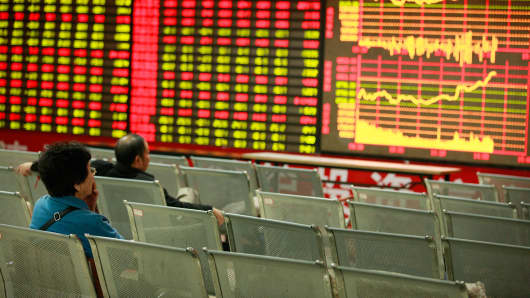Asian stocks have had a solid run this year, with the MSCI Asia Ex-Japan Index rallying 17 percent since the start of 2012, and Standard Chartered Bank says expect another 10 percent upside in the new year.
The main driving forces for the region's equities will be a continued recovery in the world's two largest economies - the United States and China – which will support risk appetite, together with strong foreign portfolio inflows and an improvement in earnings, the bank wrote in a recent report.
Asia is projected to see foreign inflows of $42 billion in 2013. Emerging markets saw net inflows of around $16.5 billion in the first three quarters of the year, according to data from Standard Chartered.
"In Asia, we see the economy recovering quite well. The Chinese economy is bottoming and that's going to support Asia as well," the bank's chief investment strategist Steve Brice told CNBC Tuesday.
An improvement in earnings will also bolster the performance of Asian equities next year, the bank said, as growth in the region picks up to 6.5 percent in 2013, from an estimated 6.1 percent this year.
"The expansion in margin will (also) be driven by corporates passing on input price increases in an effort to recover some of the margin lost due to the slowdown in consumer growth over the past three years," Clive McDonnell, head of equity strategy, Standard Chartered Bank, wrote.
While gains are expected across the board, including for the region's laggard China, the bank is betting India, Philippines and Thailand will be 2013's star performers, each offering returns of 15 percent next year.
Bet on India
Despite the sharp slowdown in India's economy this year, the country's benchmark BSE Sensex index has surged over 25 percent so far this year on the back of strong buying by foreign institutional investors and optimism surrounding the government's reform efforts.
(Read more: Why Booming Indian Equities Will Rock in December )
Next year, the bank forecasts stocks will get a boost from interest rate cuts by the Reserve Bank of India, which will reduce the cost of capital and support investment growth, and from easing inflationary pressures – a positive for profit margins.
Standard Chartered economists expect inflation in India to moderate from 7.8 percent in 2012 to 6 percent in 2014, providing room for policymakers to reduce rates by up to 100 basis points in the year ahead.
The Philippines' stock market is also expected to continue its dream run next year, after rallying 33 percent since the start of 2012.
"This is based on our view that the rapid growth in the business process outsourcing sector is leading to increased middle class income growth, which in turn is driving a structural rise in consumer spending," McDonnell wrote.
(Read more: Who Is Asia's New Darling of Investors?)
Finally, Thailand's SET index, which has almost matched the Philippine's PSE Composite's stellar performance this year, up 31 percent year-to-date, is also expected to be among the best performers in 2013.
(Read more: Thai Stocks to Get Boost From Infrastructure Push)
McDonnell said next year's upside will be driven by a rise in investment in the country - by domestic and foreign investors.
The Thai government is planning to spend more than 2.2 trillion baht ($71.1 billion) over the next seven years to build railways and roads and another 350 billion baht ($11.3 billion) on infrastructure to prevent a repeat of the devastating 2011 floods that dragged economic growth down to just 0.1 percent for the year.
On the foreign investment front, a number of investors, including Japanese automakers, have announced plans to add production capacity in the country.
Don't Write-Off China
As for China, the bank said it is growing more confident that the benchmark Shanghai Composite - which has underperformed considerably in the recent years – falling 5.2 percent year-to-date, after declining 22 percent in 2011 - will stage a turnaround in 2013. It forecasts gains of 12 percent for the market next year.
McDonnell argues that a recovery in earnings, alongside a pickup in growth, and an upturn in money supply will support the market.
The consensus 2013 earnings per share growth estimate rose from 10.7 percent in September to 11.5 percent at the end of November, according to the bank.
Meanwhile, money supply or the entire stock of currency and other liquid instruments in the economy at a particular time, has historically tracked the performance of the market closely and this measure has started to recover. In September, for example, the growth in a measure (M1) of money supply accelerated to 7.3 percent from 4 percent in August.



